Text

"My body shone so brightly in the sun that I felt very proud of it, and it did not matter now if my axe slipped, for it could not cut me. There was only one danger - that my joints would rust; but I kept an oil-can in my cottage and took care to oil myself whenever I needed it. However, there came a day when I forgot to do this, and being caught in a rainstorm, I was left to stand in the woods. While I stood there, I had time to think that the greatest loss I had known was the loss of my heart. While I was in love, I was the happiest man on earth; but no one can love who has not a heart, and so I am resolved to ask Oz to give me one.”
– L. Frank Baum, The Wonderful Wizard of Oz
Los Angeles, the world where I've hung my shingle for nearly 17 years, is a place of many moods. There’s the bright sunlight and a creative sprawl that really only exists in our collective fantasies of fame and fortune, and there is the corrupt, overpopulated dystopia, built on illusion and eating itself from within. The truth is that this “seventy two suburbs in search of a city” is both, a schizophrenic planet of its own where the beautiful parts of human nature are always at odds with the ugliest. You get pulled in one direction or the other on any given day, scrambling for a sense of peace that may or may not exist. Like a bittersweet pocket symphony by The Beach Boys, you feel bits of wonder and possibility here and there, but they’re usually tempered by the suspicion that you’re heading down a blind alley.
Many people can be dissociative and narcissistic, coming off as weirdly alien or robotic in how they transact rather than interact. Most of the time, you work hard and keep to yourself, finding comfort in that because you think it’s temporary. Once you start to believe that it’s not, though, despair can set in, amplifying itself to the point where you might not hear anything else. The fabled “golden sunshine” noted by David Lynch (whose disembodied head above looms Oz-like by the beach) becomes harsh and unforgiving, and that unfurling sense of space claustrophobic. You can’t get your head above the water, but you can’t touch the bottom either. So, is it really a “city of dreams,” or a junkyard strewn with what’s left of them? Ask me again in 17 years.
#los angeles#david lynch#dystopia#beach boys#wizard of oz#california#santa monica#dorothy parker#oz#l frank baum#brian wilson
0 notes
Text
In a culture where nuance and intelligent discourse are bludgeoned into unrecognizable heaps of brain matter on a daily basis, bad faith takes and gross distortions that serve other agendas are to be expected. Two weeks ago, filmmaker Jonathan Glazer won an Academy Award for Best International Film for THE ZONE OF INTEREST (to me far superior to and more morally penetrating than the turgid hagiography that won Best Picture, but I digress). The speech that he gave to an audience of millions was brief and nearly apolitical, speaking to what should be a fairly obvious moral need to fight dehumanization on any stage. Yet his words were immediately attacked by a very vocal contingent for supposedly “renouncing his Jewishness” and equating the mass murders happening in Gaza (at the hands of the current Israeli government) with those carried out by the Nazis in World War II. That his words did neither speak to how disingenuous and self-serving many of these people are, their willful ignorance and moral repugnance clear given what the entire world sees with their own eyes, every single day in the Middle East.
I’m reminded of what Naomi Klein wrote, that “Glazer described his characters not as monsters but as ‘non-thinking, bourgeois, aspirational-careerist horrors,’ people who turn profound evil into white noise.” I can’t think of a better description of those who have signed their name to a blacklist that is nothing more than an embarrassing and shameful apologia for genocide. Many of them are executives in the film industry (and random, sleezy makers of middling horror movies) who build ivory towers on the backs of those who tirelessly create for them, who have no sense of self awareness and a complete inability to be self-critical and realize they are on the wrong side of history. Glazer’s speech, to me, was profoundly humanistic, an almost too diplomatic way of speaking out about the horrific bloodshed to an audience not used to being called out on their moral blindness. That the work, and his words, will long outlive any of these people’s moral failings isn’t up for debate. But for now, it’s a disgusting and disappointing misrepresentation of a great work of art.
#JonathanGlazer#zoneofinterest#Oscars#AcademyAwards#Gaza#FreePalestine#IsraelGazaWar#genocide#ethnic cleansing#the blacklist
0 notes
Text
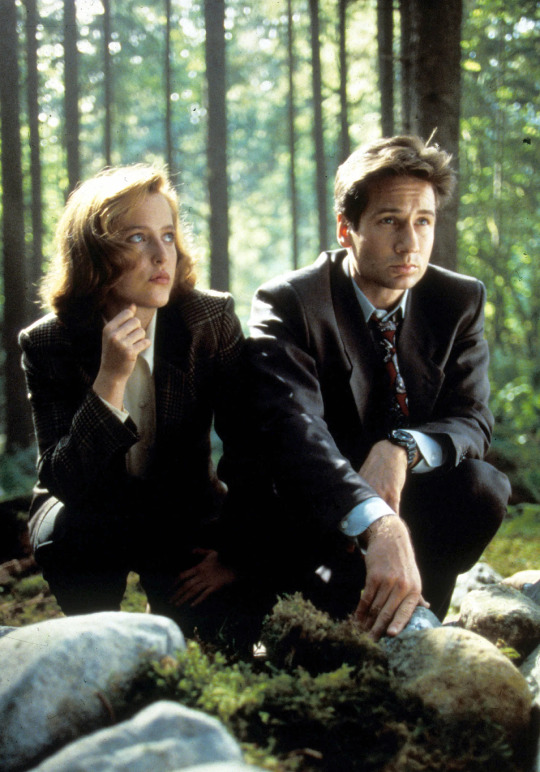
The X-Files at 30...
My deep affection for “The X-Files,” Chris Carter’s paranormal/sci-fi series that first began airing 30 years ago this week, is rooted in two distinct and formative places in my mind. The first is a love for the richly spine-chilling stories that Carter and his writers (including the wonderfully eccentric Darin Morgan, “Final Destination” creators James Wong and Glen Morgan, and Vince Gilligan, who later created “Breaking Bad” and "Better Call Saul") offered a seemingly limitless supply of, back when seasons ran for 23 or 24 episodes rather than the paltry 12 to 13 they do now. This love came from exposure at a young age, through my Dad’s work with the psychological fringes of society, to aspects of human nature that were dark and unusual. The show had a broad “government hiding the existence of aliens” storyline thread throughout its run, but for me the best tales were the “monster of the week,” which stood alone as smart, often wickedly funny storytelling AND go for broke yarns that sent your blood into icy creeps. These appealed to my sense of an uncanny borderland that was often kept in the shadows, ostensibly for the sake of not destabilizing normalcy and prosperity but really just to avoid dealing with the bad karma built up over a century of neglecting the truth about darker forces in the world.
The other reason is that, for a number of years, I wasn’t entirely close with my older sisters, due to both the difference in age and because I was the only boy (and a weirdo outlier, interest-wise, at that). At the time "The X-Files" appeared, my sister Heather had just had her first child, and I began to spend more time with her as she settled into motherhood. I would go to her house on Friday nights, and we’d watch the new episode after her baby, Max, had gone to sleep. To this day, I don’t know exactly why our minds met in this particular way, but it means as much to me now as it did then. We became genuine friends in the way you do with siblings as you get older, understanding each other on a deeper level and recognizing the virtues in one another that a typically combative brother/sister dynamic drowns out for so long. She saw that I was a (reasonably) smart, capable, creative adult, and I recognized that she was a warm, intelligent, funny, and nurturing person. We greatly enjoyed that time together, and have kept a strong bond since, even living far away from one another. In that sense, Carter’s odd, creepy show was a real gift, bringing us together within its labyrinth of ideas with graceful suspense and great humanity.
#xfiles#gilliananderson#davidduchovny#chriscarter#vincegilligan#supernatural#sci-fi#horror#television#monsters#creatures#aliens#extraterrestrials#conspiracy#government#FBI#BehavioralSciences#foxmulder#danascully#mulderandscully
2 notes
·
View notes
Text
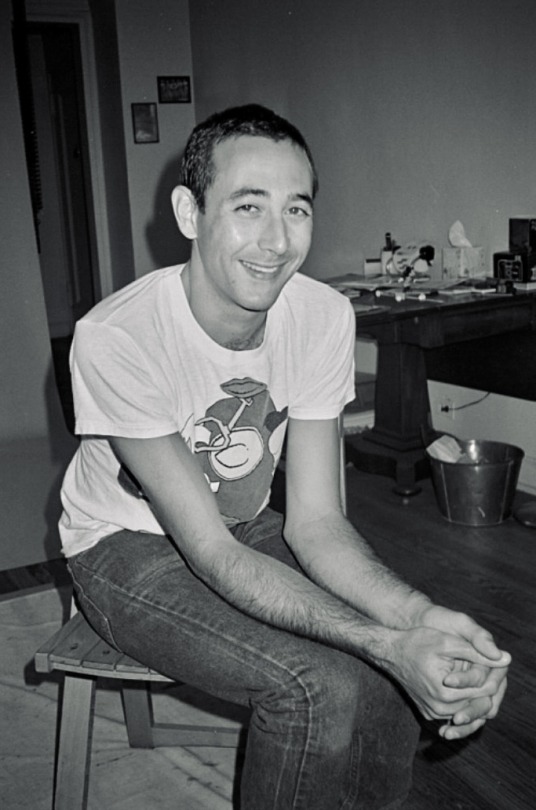
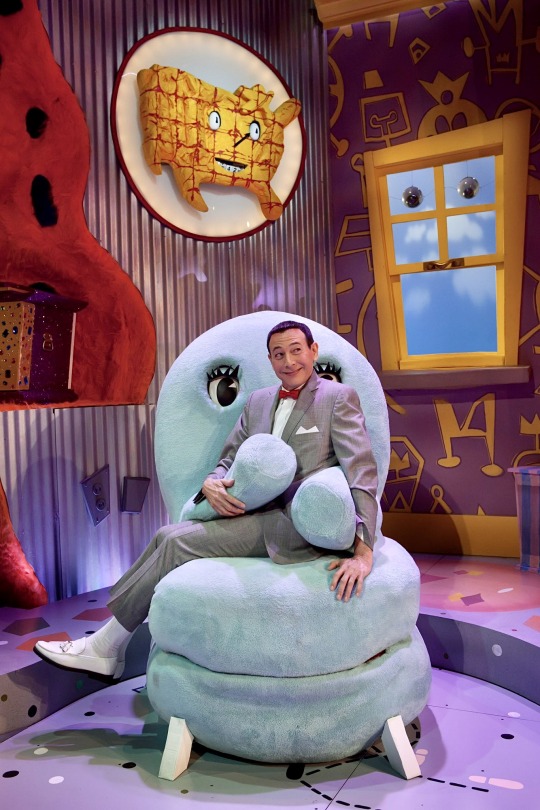
Paul Reubens, 1952-2023
The secret word for today is SAD. I wasn’t expecting to wake up on an otherwise unremarkable Monday morning and be upset about the loss of Paul Reubens, who portrayed that guiding light of oddball children and a particular world of wondrously eccentric humor, Pee Wee Herman. Back before iPads or cell phones, a lot of a kid’s weekly excitement centered around shows they’d watch on Saturday mornings. Mom might go to Jim’s Bakery on Morro Bay Blvd. to pick up donuts for them to graze on (which didn’t help later in life) while enjoying the likes of The Smurfs, He-Man, Scooby Doo, Inspector Gadget, Transformers and G.I. Joe. Eventually, an idiosyncratic, rebellious character burst onto the scene, with a distinctive style of dress and a view of the world that embraced the kaleidoscopic weirdness and wide-eyed sense of humor unique to childhood.
With “Pee Wee’s Playhouse,” Reubens became the outsider’s Mister Rogers, coating life lessons and a respect for generosity and tolerance in a candy-colored frosting that was both nourishing and like riding a humungoid sugar buzz. You were never lonely in the company of Pee Wee or his merry band of larger-than-life friends, but filled with a passion for learning, creativity, and self-expression that manifested itself as you grew up and found your place in the world. You were momentarily excused from the anxieties of childhood and given permission to reach into your creative spirit to find whatever means would help you understand a life that so often defies comprehension.
Reubens later became one of the most unusual movie stars with the creation of the unimpeachable classic “Pee Wee’s Big Adventure.” Written with Phil Hartman (RIP), Reubens crafted what remains one of the most inventive, sweet, and joyful films to come out of a decade rotten with greed and moral collapse. He tapped a shy, mumbling animator with two brilliant short films under his belt to debut as a director, and in turn gave the world the brilliantly distinctive vision of Burbank’s own Tim Burton. I suspect Reuben’s gift to the world he leaves behind will take years to calculate, especially for those of us reared in the warmth of his imagination.
1 note
·
View note
Text
youtube
Steven Spielberg has always been less a filmmaker than a force of nature. There is something so elemental and iconic in the fabric of his work, especially in blockbusters that don’t so much unspool onto a screen as burst straight off the celluloid to sweep you up in 2 hours of transcendent, cathartic adventure, that any other director remains at a loss in trying to understand, let alone recreate, such a magic potion. It was 30 years ago, a week shy of my high school graduation, that I saw Spielberg’s version of the Michael Crichton novel “Jurassic Park” at a sprawling, old school movie house in San Luis Obispo called The Fremont. It was a packed house, with a 1000 people filled to the brim and running over with an excitement bordering on ecstatic giddiness, and what sprang to life onscreen became more than just a fun night at the movies. It became something we experienced in our bones, as if living inside the picture itself, feeling the joys and terrors of the story right along with its characters.
I saw the film 4 times that week, and while that may expose my bonafides as a dork, it also speaks to the effect it had right out of the gate and forever after. I have a particularly fond memory of going with most of my senior class to see it on “ditch day,” after we had all gotten sunburned at the local swimming pool. It was an adventure that gifted us with things we had never seen before, but in a way that wasn’t bloated and empty like later spectacles that tried to build on its success (including ALL of the inferior and unnecessary sequels). Instead, it was smart, funny, light of foot and legitimately terrifying all at the same time. Shot with effortless dazzle by the great Dean Cundey (veteran of many John Carpenter and Robert Zemeckis films), cut by the inimitable Michael Kahn (who later that year edited the film Spielberg was shooting when “Jurassic” came out, “Schindler’s List”) and of course scored by everyone’s genius grandfather John Williams, Spielberg’s film still hums with so much wide-eyed wonder and white-knuckle terror that you will swoon all over again. This feeling is at the core of his great gift as a storyteller, that intuitive, uncanny ability to orchestrate an emotional experience that verges on sorcery.
#jurassic park#steven spielberg#dinosaurs#john williams#michael crichton#sam neill#jeff goldblum#laura dern#adventure#cinema#blockbuster#thrillrides#Youtube
4 notes
·
View notes
Photo
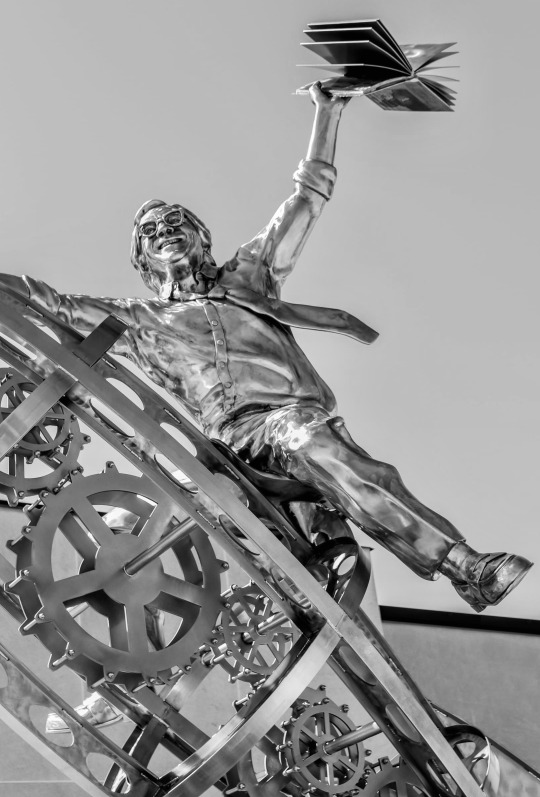
Without a library, I wouldn’t be half the person I am. That may sound overly dramatic, but it’s a simple fact. So many of the things that people take for granted today, whether it’s the internet, streaming services, cell phones or even a home computer, really didn’t exist when I was growing up. If your mind needed liberation from the cage that locked in your imagination, the key came in a nondescript laminate card that found its way into your pocket care of thoughtful parents. As you got older and might need to write a paper, you were either at the mercy of whatever encyclopedia collection your house had or hunted the shelves of your local library. For me the need for both drew me in over and over again, until the joy of discovery took over and set me on a path that I’ve never strayed from.
It was in the Cayucos library, tucked in a corner off the pier that drew tourists in the summer, that I found a book called The World of Fantastic Films: An Illustrated Survey. Hooked by the cover of a spacecraft flying over a suburban neighborhood, it was in its pages that I learned about not just who was responsible for films that had already captivated me (Hitchcock, Spielberg, Lucas), but lit the fuse of my obsession with the work of more artists (Kubrick, Cronenberg, Scott, Carpenter) I’d have never otherwise known about. My creative world exploded immediately, a mental big bang that later grew on finding those magic rectangles called “videotapes” as they appeared on library shelves. It was in those same aisles, soon joined by more at Cayucos Elementary, that I fell in love with writing itself. What began with the usual curriculum of Jack London, Harper Lee, S.E. Hinton, and Ray Bradbury soon pivoted into the more challenging realm of J.R.R. Tolkien, George Orwell, William Golding, and J.D. Salinger. It was also there that I saw a book with the cover of a ghostly face offset by a single drop of vivid red blood on its lips called Salem’s Lot. By the time I got to when Charlie Rhodes awakens at midnight to the sound of someone blowing the horn of his school bus and discovers that it is loaded with bloodthirsty children, I was a goner for a certain bespectacled weirdo from Maine.
Which is why the news of certain states attempting to circumvent the will of their sane population by closing libraries altogether rather that restock books deemed dangerous by a delusional zealot minority both breaks my heart and makes me incredibly angry. To rob both children and adults of the most basic form of both entertainment and knowledge is to starve them of everything that is remarkable about human culture. Libraries are one of the most vital conduits to that we have, with hundreds of years of accumulated wisdom and inspiration in books just waiting for a curious mind to crack them open and find something that speaks to their heart and mind.
Culture wars are always incredibly stupid, as they usually serve only to point out how myopic and bigoted one side (guess which) is. But as certain factions, who can’t seem to deal with the natural evolution of our society in the same blunt fashion that a caveman recoiled from fire before learning to harness it, push harder and harder to wipe out anything that would threaten a repressed white pseudo-Christian narrative, the stakes have risen to a terrifying level. These are people who are fine with the lives of our country’s children being devastated by constant gun violence but draw a line at offering those who may still be alive the chance to broaden their mind and make up their own minds about what will make for a better life. Fueled by crackpot conspiracy theories and stoked by the fulminating opportunism of right-wing media, they threaten both library staff and patrons with violence if they continue to support inclusiveness rather than fortify division. They turn up at city council meetings to spout shrill nonsense and attempt to bully their way into what they feel is some half assed “moral” victory but is really just a bunch of paranoid psycho bullshit. Even though I don’t yet have any kids, this kind of knee-jerk suppression makes me sick to my stomach and cannot be allowed to gain more of a foothold in this country than it already has.
0 notes
Photo
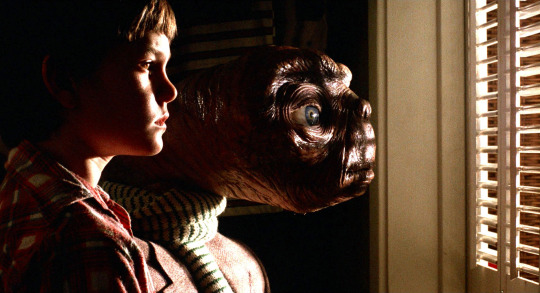
How do you fill the heart of a lonely child?
It’s a difficult question for anyone to answer, let alone if you are that 7-year-old child, living in a household where the relationship between your parents is disintegrating before your eyes and your older siblings haven’t found the balance in their own lives to even acknowledge, let alone care for or respect, you. You have friends at school and the teachers like you, but everyone tends to keep you at arm’s length because you don’t quite fit into the box that a kid that age usually does. All while a grandfather you are close with is losing a battle with leukemia, putting mortality front and center in your mind, making you realize the difference between the endless time you seem to have as a child and the reality of how little you actually will as you grow older.
Today it may seem obvious that the effects of divorce, especially on very young children, can be emotionally devastating. But in the summer of 1982, just after the end of 1st grade, I was in the middle of one with no road map, no way to talk through the wild pendulum of emotions I was experiencing without the slightest understanding of how to process them. All I knew was that the sky had fallen, and I was going to have to figure out how to prop it back up again before the whole world collapsed forever. It was an intimidating and genuinely terrifying place for my fledgling little mind to be, which is why, to this day, I thank my lucky stars that I was taken at that time to see what would become the most formative film of my life, Steven Spielberg’s “E.T. The Extra Terrestrial.” From the beautifully judged subtlety of Melissa Mathison’s script and the careful modulation of wonder and realism in Allen Daviau’s photography to the effortlessly stunning swell of John Williams’ musical score and the remarkably moving, clear-eyed performances Spielberg draws from Dee Wallace, Peter Coyote, Robert MacNaughton, Drew Barrymore and (especially) Henry Thomas, everything in the film is now rightly beloved and iconic and mark it as one of the great works of cinema.
At the time, though, Spielberg’s film was not only a mirror of my own life, but also a means of survival, a life preserver that kept me from drowning in the deep, dark, destabilizing waters I found myself in. My parents did the best they could to keep my sisters and I from the frightening emotional reality of what was happening, but there was only so much they could do. Kids, especially young ones, are incredibly sensitive and intuitive and seem to be aware of everything despite a parent’s best efforts to protect them from so much pain. The raised voices, the slamming doors, the inevitable yelling and screaming, all of it colliding in a child’s heart to the point where it feels like it’s going to burst. As that kid you do whatever you can to block these things out. You escape into books and movies and make up stories of your own. You stay furiously active and outside as much as possible. You plot things and daydream about the adventures you might have if only you could find a way out, a road that would take you as far away from the storm surrounding you as possible, leading to a place where you could reset your heart and find peace in your mind.
As fate would have it, that road appeared from the moment the end credits of “E.T.” rolled and I wiped away the tears flooding my face (which still happen, even now, without fail). The path I was meant to be on became clear, and Spielberg’s film became, in its own small, hushed, profoundly emotional way, the wellspring of my creative ambitions. Before, I might’ve been an astronaut or a teacher. Something grounded, definable, recognizable. After, there was never a question where life would go. 40 years later, I am still on that road, knowing that I will likely never stop moving forward. I will never stop wanting to create, to express myself, to connect with other people despite my inherently reserved nature. I can’t help it. There is nothing I love more than being able to work with a family of actors and crew to bring something to life that wasn’t there before, to carve out a little piece of our collective imagination and offer it to people via sleight of hand and light and shadow. And while I haven’t yet started a family in the classic sense, I still feel that time will come. Until then, films keep my heart full. They keep me laughing, gasping, shuddering and, yes, crying. For that I thank the diminutive alien who was left behind, like I had been when I was a kid, only to find his way home with help from the love and resolution of a child.
0 notes
Photo

“We must end this uncivil war,” and “raise this wounded world into a wondrous one.” There were many powerful words today, both from the new President and a gifted young African American poet stepping onto the national stage for the first time, that reached toward healing. They were empowering and hopeful, and couldn’t have been more of a contrast to the bleak, characteristically self-obsessed apocalyptic vision of “American carnage” touted by the former would-be occupant of the Oval Office just 4 years ago. Given the year that this country has just endured, with a devastating economic collapse and the loss of almost half a million friends and family members (to date), these words were critical in beginning to reset the psychology of our nation from crippling fear, anxiety and rage to the strength, determination and optimistic perseverance needed to move forward and conquer not just a (still peaking) pandemic but the poisonous, bigoted dishonesty that allowed it to gain such power in the first place.
However, as obvious as it may sound, words are only a beginning, and must be followed by actions. There is an unbelievable amount of work to be done, much of which will literally mean the difference between life and death for millions of Americans. We must absolutely savor the air and simple gifts that today’s ceremonies have given us, but we must also steel ourselves for everything that lies ahead, holding our government to account by keeping fire at the feet of politicians who might stray in pursuit of power for its own sake (something exemplified so catastrophically by the last 4 years). We must do it without falling into the kind of cynicism that is admittedly easy in the face of the lofty sentiments and soaring rhetoric offered today. Rather than folding one’s arms and casting an immediately dismissive eye on anything that doesn’t line up perfectly with the dimensions of one’s own ambitions, we have to embrace the possibilities of a forceful dialogue, to passionately and optimistically find solutions that will actually get things done.
0 notes
Text
“Searchers after horror haunt strange, far places...”
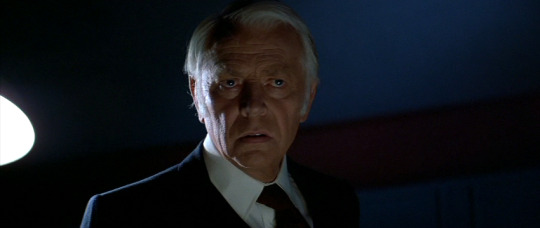
I was thinking of certain scary movies I revisit around this time of year and why, and ended up writing some stuff below.
The Dead Zone (1983, Dir. David Cronenberg)
This one isn't strictly horror but captures the bleak, wintry New England vibe of early Stephen King perfectly, and has what is to my mind Christopher Walken's most moving performance. One of the few times Cronenberg has cared less about disturbing you or ramming a philosophical point home than in using a solid narrative to explore the emotional experience of a man caught up in an extraordinary situation. One of those films that deepens in your mind the more you live with it.
The Haunting (1963, Dir. Robert Wise)
Shot widescreen in gorgeous black and white, this one is one of the crown jewels of haunted house pictures. From the first moments it has a rich sense of foreboding, like a whisper that sends chills down your spine. Great performances, especially from Julie Harris as a young woman who was never quite right slowly going insane.
The Spiral Staircase (1946, Dir. Robert Siodmak)
A small gem from the 40's, in which a young mute woman is terrorized by a shadowy killer in a big house during a thunderstorm (do these films exist in any other conditions?). Small town scares with a bit of a noir feel, and a very creepy score. One that you see and instantly calls to the part of your mind that remembers that one time you ran home a little faster as the sun went down, a breeze kicked up, and you were just sure there was something moving back there in the shadows.
Frankenstein (1931, Dir. James Whale)
An obvious choice, but no less incredible because of it. I deeply love the first batch of Universal monster films because of how simple and pure and cinematic they are. Limited production values but MASSIVE amounts of atmosphere and feeling. Some people might feel they are dated but I think love them even more because of that. I love history, and the dark corners of these pictures carry a sense of not just film history, but of the old world itself, and the rhythms it had before it was overrun with technology. Terrific performances by Boris Karloff and Colin Clive, plus a very evocative and theatrical "introduction" before the film begins.
The Bride of Frankenstein (1935, Dir. James Whale)
Same as above, though this is a much more polished, eccentric and entertaining film. James Whale had free reign to do what he wanted, and he cut loose, aided by a gorgeous Franz Waxman score and indelible work by Karloff and Clive (again), Elsa Lanchester and Ernest Thesiger (whose prissy Dr. Pretorious is one for the ages).
The Mummy (1932, Dir. Karl Fruend)
A different type of monster, but just as eerie and surreal. Another of my longtime fascinations is the culture of ancient Egypt (don't get me started on "Land of the Pharaohs" or "The Ten Commandments"), which this quick film indulges along with a dash of the inherent creepiness that was completely missing (IMHO) in any of that stuff Brendan Fraser did. Again, the stilted nature of some dialogue and performance is all part of the allure, making it all feels so alien as to fit the mood of the story perfectly.
The Innocents (1961, Dir. Jack Clayton)
Another black and white widescreen beauty, this one a more subtle, ethereal ghost story centered on a pair of children that a well meaning but naive nanny (Deborah Kerr) has been hired to look after. Buried secrets are uncovered and dark forces unleashed, but in a much more subtle and emotional way (for a modern equivalent, look at something like "The Others"). The use of shadow and space here will make your knees buckle in spots, and the general aura of uneasiness will raise the hairs on your neck.
The Changeling (1980, Dir. Peter Medak)
George C. Scott loses his wife and daughter in an accident, then moves into a large, foreboding mansion in Seattle to focus on his musical compositions and recovering emotionally. Obviously, things don't go as well as planned. The trappings of the haunted house genre are given a real emotional grounding, and the backstory feels organic and engrossing rather than just an excuse to throw in loud noises. Wonderfully acted, designed and photographed, a quiet nail biter.
Something Wicked This Way Comes (1983, Dir. Jack Clayton)
Though a bit Disneyfied, this one is still a perennial because of how it captures that mixture of wonder and fear that Ray Bradbury's work had, pitting ordinary people up against sinister forces closing in on the spaces we consider the safest (in this case, a Midwestern town where the only thing that changes are the seasons) and crystallizing the moment when a parent realizes how little power they have to protect their kids. Driven by two wonderful performances, from Jason Robards (weary and homespun) and Jonathan Pryce (deliciously malevolent), this film has a genuine feel for small town life, the way that autumn can seem both hopeful and menacing, and the perils of both wanting to grow up too fast and wanting to be young again.
Salem's Lot (1979, Dir. Tobe Hooper)
The first thing that I remember absolutely scaring the shit out of me as a kid was a moment in this TV production involving nails scratching a child's window in the middle of the night. I won't say more about THAT, but I will say that despite this being made for late 70's television, with all of the restrictions inherent to that time, it's still pretty damn creepy, which is both a testament to Stephen King's original book and to the level of skill and atmosphere Tobe Hooper was able to give it. The depth of creepiness and history isn't as rich as in the book, but there is an approximation of the story's eccentric sprawl that draws you in, plus the eccentric, nostalgic vibe you get from late 70's TV.
Go To The Head of the Class (from "Amazing Stories") (1986, Dir. Robert Zemeckis)
A spooky, spirited lark made just after "Back to the Future" became huge. Nothing ground breaking, just a fast, funny goof made with Zemeckis' characteristic visual spark for Spielberg's mid 80's TV show and featuring a wonderfully cracked performance by Christopher Lloyd pitched somewhere between Doc Brown and Judge Doom (roles he played on either side of this one).
Curse of the Demon (1957, Dir. Jacques Tourneur)
The fact that my own family was menaced by Satanists (angry at my father for hauling one of their leaders into jail) when I was 9 probably has a lot to do with why I respond to this film, in addition to the general air of menace and atmosphere that Tourneur was great at (see "Cat People" and "Out of the Past"). Concerning the curse put on a man who debunks cults by the nefarious leader of one, this is a quick, creepy psychological ride with a classy script that doesn't scrimp on jolts.
Horror of Dracula (1958, Dir. Terrence Fisher)
Innumerable vampire films litter the history of scary movies, and there are certainly some that may have more ingenuity and pizazz than this one. But something about this early Hammer film, with its chilly, heightened gothic atmosphere and a sense of reality being peeled away in front of your eyes, sticks with you. It may be Terrence Fisher's brisk, efficient skill for building horror, or it may be the iconic performances of Peter Cushing and the great Christopher Lee. Or it may just be that particular, peculiar English sense of impending doom these films have. I first saw this one on during an AMC marathon (before they ever had commercials) hosted by the director of the next film on this list, and it's easy to understand how it spoke to his own feeling for the inevitability of a malevolent force slowly closing in on you.
The Thing (1982, Dir. John Carpenter)
Cold, stark and unsparingly tense, I saw this at a drive in when I was 7, and it sunk its teeth into me before I ever knew who John Carpenter was. The sense of isolation and foreboding built into the Antarctic location extends to the feeling of the direction, acting, photography and even the musical score (a mix of Ennio Morricone and Carpenter himself). At its core is the idea that you can't trust anything, whether it's the physical elements around you, the man sitting beside you or even your own sense of self. The opening sequence, of a dog being chased by a helicopter in the snow, is just gorgeous and evocative, and Dean Cundey's photography throughout is lithe and lurking. I think this film is so powerful for me because it came at a very formative time, the period between 8 and 11 where I was developing an understanding of the larger forces in the world that were not benevolent, that did not have any compassion, and did in fact want to kill you.
Halloween III: Season of the Witch (1982, Dir. Tommy Lee Wallace)
This one got a unduly bad rap out of the gate, as it went in a wildly different direction in terms of its story and had nothing to do with Michael Myers. Aside from that, though, this is very much in the early 80's Carpenter spirit, directed by schoolmate/editor Tommy Lee Wallace, shot by Dean Cundey and driven by an unsettling, dread soaked score by Carpenter himself. True, there is a definite B-movie spirit to it, with obligatory kill scenes that feel too calculated and acting (aside from lead Tom Atkins and the wonderful bad guy Dan O'Herlihy) that can be a little shaky, but overall it's a creepy, entertaining story about modern day witchcraft (with a TV jingle that will get in your head and stay there forever). Again, part of its appeal may go back to where I grew up, in a small, rural place where something always felt a little off, where bad things might be happening at any moment right under your nose, and the dark carried a powerful emotional force.
2 notes
·
View notes
Text
“Having said that…”
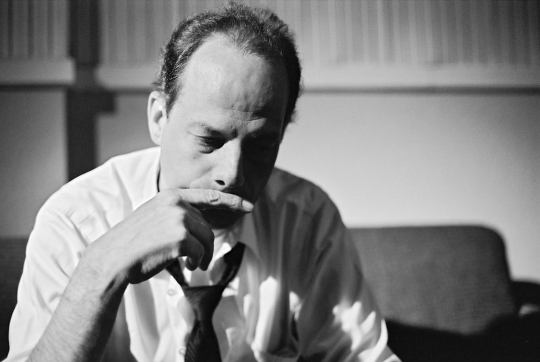
Glynn Beard, who at various times throughout my college experience was a teacher, sounding board, (admittedly eccentric) voice of reason and friend who gave as much encouragement as he did grief for all of the ways in which our very specific tastes diverged, always said that I was full of shit. At the time he was right, of course, but at least he took mercy on my fledgling adult soul by saying so from behind one of those (for him, characteristic) thin brown cigarettes with the kind of caustic wit that puts a person in their place at the same time as it pushes them to go further than they think is possible. Glynn was quick to knock the illusions out of those who came to film school with stars in their eyes, serene and clueless in the assumption that wealth and fame waited for them at the other end of those few years where creativity grew in inverse proportion to the attention given to either sleep or physical health.
My own introduction to Glynn came with the first class I attended at the motion picture campus (really just a tiny former bank across the street from an IHOP) of Brooks Institute of Photography in Santa Barbara, after months trapped amongst the effete cognoscenti of the still photography department. Everyone was settling in to our seats when a tall, wiry figure in an X-Files “The Truth is Out There” t-shirt sauntered in looking like a refugee from some B horror film you might see on Job Bob Briggs’ “Drive-In Theater.” His gift as a teacher was to seize, almost immediately, on what was unique about the individual personalities of his students and coax that out of the work we’d submit for each assignment. In the time that I knew him, Glynn’s affections vacillated between things that were highbrow and others that were more disreputable. He swore by Sam Peckinpah and Gustave Flaubert but just as easily spoke in a key that fans of Sam Raimi or Jack Ketchum would recognize.
Since living in Santa Barbara at the time (or ever, really) wasn’t cheap, I took on a couple of jobs to make ends meet. One of those was as a TA at our State Street campus, checking out gear and troubleshooting for other students but more often making use of the flatbeds to edit my own projects. I saw Glynn often during those shifts, both in the classroom and in the editing room during the wee hours (where I’d alternately be cutting or catching a nap under the flatbed). Initially, he wasn’t the easiest person to warm to, unless you took the time to endure the near constant cigarette smoke out on the back stoop in the middle of the night and get to know him. There were talks about Peckinpah, of course, in particular of my affection for “Bring Me The Head of Alfredo Garcia” and “Pat Garrett and Billy the Kid,” as well as what to make of Jim Jarmusch (Glynn was a fan of “Stranger Than Paradise,” while I was more of a “Mystery Train” guy) and John Cassavetes (Glynn was for “Faces,” I for “Minnie and Moskowitz”). At a certain point I got hooked on Terrence Malick (“The Thin Red Line” had just been released), and there were lots of opinions thrown back and forth about whether his languid style was something that could remotely be emulated (as I was stupidly keen to try in a short I was set to make). Sometime later, Stanley Kubrick passed away, which of course led to endless talks about irony, morality, symmetrical composition and the virtues of Kabuki acting.
In addition to an unabashed love of film and the possibilities each new work held in store, it was obvious that Glynn also had deep emotional struggles going on inside from time to time. He did his best to cover them with a certain sense of academic aloofness, but he could no more hide them away than disengage from an argument over films he thought were garbage. These were issues, with family, with filmmaking, with the effect of what he called “the costs that we pay to live in the modern world” might have on his child, that fueled his creativity, and were the motivation for putting the care into articulating his thoughts through his art that he did. All of this is to explain why the fact that he left us, with so much still to say, makes me so profoundly angry. Among the long-term projects he worked on was a series of autobiographical short films. Because of a long-term estrangement from his father, Glynn had conceived these films as a way of exploring the effects of that relationship on his life, as well as carrying on a conversation with his own son and imparting the wisdom and experience he had collected up to that point. In the film “Son,” there is a scene where Glynn offers suggestions about the works of film and literature he would insist his son explore when he was old enough. Among the books he mentions is the aforementioned Flaubert’s “Sentimental Education.” He cops to the story being a pretty brutal read, noting that “you’ll wanna give up a hundred pages in,” but then he adds, “if you can just get to the ending, it will all make sense.”
As I write this, I am deeply saddened and frustrated that Glynn was not able to make it to the ending, that he may not have been able to trust how life itself (and those you share it with) is as much a work of art as anything he (or anyone else) puts in front of a camera. In all fairness, having not seen him in years, I can’t speak to his state of mind in the days before he passed. Trying to process the sense of helplessness felt in the face of all this, or come to terms with the fact that someone whose intelligence I trusted, who advised me on so many levels and who told me as I graduated that I was “gonna be just fine” as a creative artist, feels completely futile at this moment, and probably will for some time. In the midst of that, though, I have a lot of work to do. Thoughts and feelings to express, stories to tell, and many films to make. Ultimately, Glynn’s impact on my life was that he recognized my worth creatively and empowered me to do something about it, and it is with respect for his memory that I get back to that. I’ve faced many demons of my own, some of which pushed me right to the place that Glynn ultimately couldn’t get beyond. I am deeply saddened for his son, and for those of my friends who had experiences similar to mine under his mentorship. In the midst of our grief, a number of us have reconnected, to share our shock and sadness, to laugh about certain memories, to pay our respects to someone who affected all of us.
Glynn’s passing has been more destabilizing than I would have imagined, which is why I’m trying to focus on the good memories, of which there are many. Whenever we got into some heavy talk, whether it was about Bush-era politics, screen violence or a particularly heady episode of “Star Trek” (original cast) that one of us was passionate about, Glynn would laugh, diffusing the situation and bringing the chat to a close with his usual “on that light and cheery note…” I wish him peace and owe him a great debt of gratitude, which I hope to repay through the work that I do. Though I had always imagined we’d talk again, I’m thankful for the times that we did, and for what he gave me both personally and creatively.
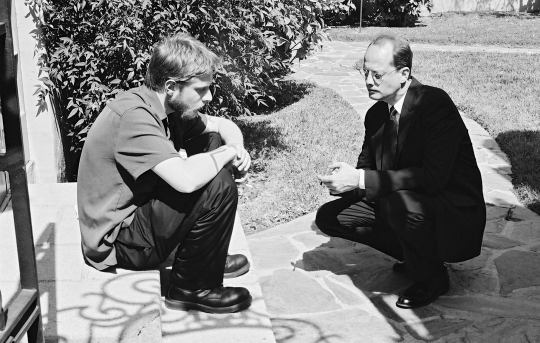
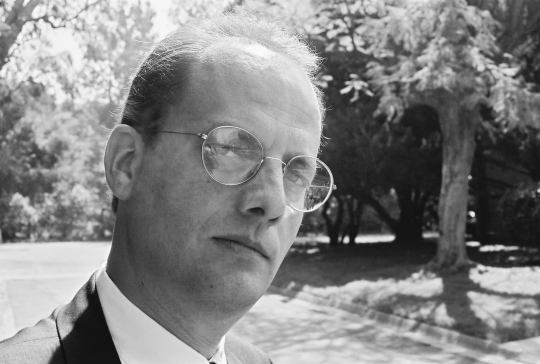

NOTE: Photos of Glynn by Nate Eckman on the set of Jacob Strunk's 2004 film “A Shadow Before Sunrise.” Provided by the director.
0 notes
Photo
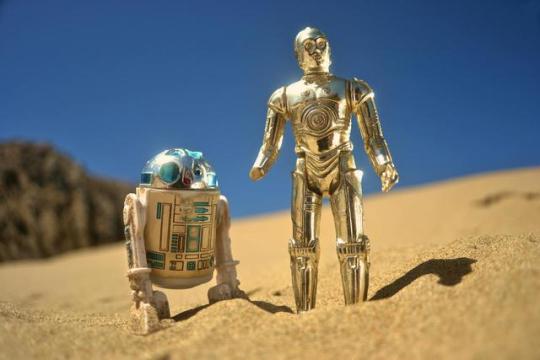
These days, anything written about a galaxy far, far away must have some measure of hagiography to it. After all, in the 40 years since the first Rebel blockade runner bombarded our senses trying to escape a Star Destroyer, the sprawl of a universe that a bespectacled mumbler from Modesto built up in his mind and then made real for the rest of us has only grown and deepened, to a point where its influence on our culture, on what we need from our storytelling, is incalculable.
In terms of my own life, to call it formative would be a ridiculous understatement. Whether I was turning the tire section of my elementary school jungle gym into the cockpit of the Millennium Falcon to lead a group of friends through daily adventures, lining up for hours to have the best seat at the first show of each new film, or shepherding a ragtag bunch of prepubescent thespians through a stage play of “Jedi” when I was 9, it feels like this world has always been there, like air, unrequited love or bad math grades, intertwined so completely with the strands of my imagination that the imagery rocketing off the celluloid can’t really be separated from what I see in dreams.
That doesn’t mean that I hold it in such untouchable esteem that I can’t see when it stumbles or falls short, but the fact that it exists at all (given its painful, prolonged birth, the improbability of its enormous success or the deluge of criticism that continues to greet each new iteration) is a bit miraculous. Yes, it is only make-believe. But it does make you believe, in ways you don’t realize until they burst forth in front of you and take your breath away, rousing you out of your theater seat and into some great new adventure.
Photo taken on Tatooine (aka Morro Bay) by John Harvatine IV
0 notes
Video
youtube
I was in my 3rd year of college, at a screenwriter's symposium in Santa Barbara during its annual film festival on March 7th, 1999. Among the writers sharing their experience and advice were two amazing women who are no longer with us, Nora Ephron and Carrie Fisher. In the midst of a Q and A, a film executive seated near the front of the audience stood up and announced that Stanley Kubrick had died earlier that morning at his home in the English countryside. Shock rippled through the crowd, and as the discussion came to a somber and subdued conclusion, everyone wandered out of the Riviera Theater in disbelief. Stanley was one of those great artists most people felt would outlive us all, continuing to make gorgeous, precise films up to the last minute that were profoundly moving in all the ways that had nothing to do with sentimentality. And indeed he did just that, working on the post production for "Eyes Wide Shut" until the night his 70 year old body simply gave out. His absence created a huge vacuum in the world of art, one that has never been filled, and likely never will be.
0 notes
Photo

At the risk of hanging a “sell by” date on myself, I will say that, like most folks of a certain age, Bill Paxton and I go WAY back. I first saw him on my inaugural solo trip to visit my Dad in Santa Barbara, when he rented "The Terminator" because he knew I'd get a kick out of the time travel story and car chase mayhem (both being very important considerations to a 9 year old). In the first of several performances for Jim Cameron, Paxton came on early, a striking figure with that spiked hair and tire track face tattoo, delivering one of many indelible Paxton lines to a naked Arnold Schwarzenegger: "Nice night for a walk, eh?"
Our paths crossed again on a summer trip to New England, when my sister and I sat out a terrible lightning storm in a ramshackle Portland, Maine theater watching Cameron’s "Aliens" (age rules were a bit more lax then). Paxton’s PFC Hudson was one for the ages, small in the grand scheme of things but one of the most memorable (and as always, quotable) parts of a film swelling with iconic moments (“Hey Vasquez, have you ever been mistaken for a man?” “That wasn't funny, man," "Somebody said alien, she thought they said illegal alien and signed up," "Hey Sarge, you know you’ll get lip cancer smoking those,” “You tell me, man, I only work here,” "Yeah man, but it's the dry heat," and of course, "game over, man, game over"). Around the same time Paxton found his way into the cinematic universe most characteristic of the 1980's, Shermer, Illinois. As created by John Hughes, Chet was a blustering horror show of an older brother (“I’m telling Mom and Dad everything. I’m even considering making up some shit”) and, as it turns out, startlingly prescient harbinger of the Trump era. He embodied every cigar-smoking, gun-toting hillbilly I grew up knowing (and certain survivalist neighbors I have now), full of hilarious bluster and venom but ultimately little more than a limp dick bully.
Paxton was often a terrific “torpedo” in scenes, sweeping in like a shit-kicker and boosting the energy and humor of a given moment to new levels. One of the best examples of this is the bar sequence in 1987’s “Near Dark,” which was the auspicious second film of a New York art student with Oscar history in her future named Kathryn Bigelow. A vampire road movie steeped in the Tangerine Dream scored, wet streets and neon on a long lens aesthetic of the mid to late 80’s, Bigelow’s stab at a horror western brought a lot of style to bear, though nothing was as (that word again) memorable as Paxton’s showstopper of a massacre in a cowboy bar on the edge of the desert (http://www.dailymotion.com/video/x2r5nh_near-dark-bar-scene_shortfilms).
For every stinger of a part in 90's films like the sniveling car salesman/would be spy in Cameron’s broad, overbearing “True Lies,” or Morgan Earp in “Tombstone,” Paxton began to offer a wearier, more soulful approach to the rural everyman in such films as Carl Franklin and Billy Bob Thornton’s sweltering haunted house of a crime story, “One False Move,” and Sam Raimi’s stark, heartbreaking “A Simple Plan.” Of course there were also solid turns in blockbusters like “Apollo 13,” “Twister” and “Titanic” (the latter of which still echoes in my head from college, when I worked at a big old movie theater that played Cameron’s bodice ripping boat movie for months on end), but it was the smaller, more intense yet still meditative films that stuck.
Especially “A Simple Plan,” which I saw with my friend John Harvatine IV on a trip to LA back in college because he was from Minnesota and seemed like he’d be up for a Raimi film set on home soil. A brutal, snowbound take the money and run story with a strong beating heart courtesy of Paxton and Billy Bob Thornton, Raimi’s film layered a stock crime story with a sense of history, futility and sadness that those kinds of films rarely took the time for. To talk about some of the story’s more emotional moments would be to spoil it for anyone who hasn’t seen it yet, but suffice it to say they will crush you. It certainly did that to my Mom, who loves “Plan” and Paxton’s performance. In fact, the one time I saw Paxton in person was with her a couple of years ago, back home in San Luis Obispo. I had taken her and my Stepdad to a screening of Peter Bogdanovich’s 1971 classic “The Last Picture Show,” as part of the annual SLO Film Festival. Paxton was there as both an obsessive, lifelong film fan and a local supporter of the festival. After the film, as Paxton was chatting up one of the film’s stars, Tim Bottoms, my Mom spotted him and grabbed my arm. She was too nervous to approach him, but he was, as you’d expect and everyone will say for days and weeks to come, incredibly sweet, humble and generous as he said hello to everyone.
Though he only made two films as a director (2001’s terrific “Frailty” and 2005’s “The Greatest Game Ever Played”), and won an Emmy for his work on the long running HBO series “Big Love,” Paxton kept largely out of the spotlight with his wife and kids, and let his work speak for itself. Actors who are grounded, authentic and reliable don’t often get much attention initially, but when the time comes to take stock of who they were and what they did you’re often amazed by the breadth of what they accomplished (“he was in THAT? Wait, THAT too?”). Paxton had that and, by all accounts, was a genuinely good person, too. In a time when blustering liars and intellectually stunted strongmen are the order of the day, his life was a good example of how to work hard and do it right.
1 note
·
View note
Photo
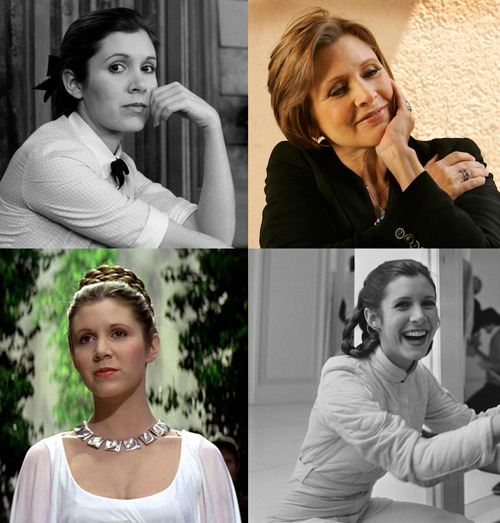
One of the great virtues of growing up the only boy in a house of women was that it instilled an unwavering belief in the strength, compassion, humor, intelligence, and transcendent intuitive power of the female mind. Your impact on my life at a very early age played no small part in that. You were really my first love before I even knew what that meant.
As I grew older, I came to understand that it was not just your incredible beauty and the lithe determination that lit up your eyes that had my heart, but the selflessness, courage, wisdom and nervy, outspoken nature of both the character you portrayed and the passionate, indelible woman who brought her to life. As written, Leia might have been played as overly steely, but your gifted mind couldn't help but warm that solemnity with an earthy, heartfelt braininess that was incredibly sexy.
In that sense, you spoiled a generation of boys, those who grew into men knowing that a woman's mind, heart and sense of humor are a gift FAR above any other superficial bullshit. For all of the struggles in your life, you came to embody the word that defined the universe you ruled over: hope.
Rest in peace. I will miss you greatly.
Note: Fisher was a tremendous writer, with "Postcards From The Edge, "Surrender The Pink," “The Best Awful," “Shockaholic," “Wishful Drinking” and “The Princess Diarist" among her published work. She also acted in "Shampoo," “The Blues Brothers," “Hannah And Her Sisters," “The ‘Burbs” and “When Harry Met Sally…”
1 note
·
View note
Video
I remember waking up and seeing the famous picture on the front of the newspaper of John signing the autograph for Mark Chapman just hours before the latter reappeared with a pistol and ended John's life. I was 5, and my parents were still together (how weird THAT seems to think of now). I didn't have a real idea of how much Lennon meant to everyone (I of course knew all of the Beatles songs in that abstract way kids know music at that age), but I did know that I'd never seen my Dad get emotional like that. It was one of those indelible moments, like Kennedy's death for my parents, or later the Challenger explosion for a fledgling 10-year-old astronaut like me. Sitting at a tiny breakfast table in an even smaller house on Driftwood and Napa in Morro Bay and seeing adults break down like that, not understanding how pieces of art created by a stranger thousands of miles away could have that effect on people. Of course I got it later, and also how it felt to be a son who suddenly lost his Dad, but back then it was still a mystery.
0 notes
Photo
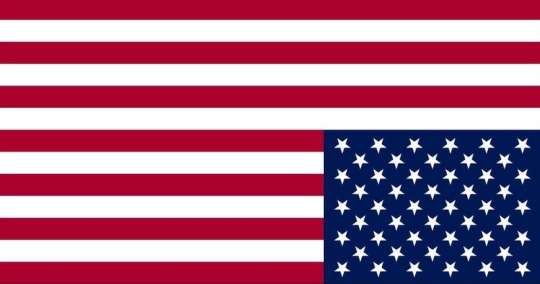
16 years ago the candidate that I voted for won the popular vote but lost in the Electoral College (though even that was only truly decided later, in highly suspect fashion, by a conservative leaning Supreme Court over just 537 votes in Florida). As a result, the lazy, blundering fool who assumed office took this country into the worst recession since the Great Depression, ignored grave warnings that led to the worst terrorist attack ever on American soil, and led the breathtakingly ill-advised charge into a war in the Middle East (mainly to avenge his father's prior ineptitude in the region) that has only helped spread and darken the veil of terrorism across the world. This year it has happened again. The candidate that I voted for won more actual votes than her opponent but narrowly lost the Electoral College. And again we face having to navigate the shame and horror of an embarrassing, feeble idiot (who this time also happens to be a virulent racist, admitted sexual predator and highly sketchy businessman) sending this country reeling down what is likely to be the darkest path it has ever taken. Bigoted, alt right fascists cannot be allowed to seize a noble (if often tempestuous) country and transform it into another hateful, extremist thug on the global block. Fighting this is going to be harder than it has ever been and must happen not just through lofty idealist rhetoric, but boots on the ground, physical struggle. A vote only means so much if it's not backed up with action. It couldn't be more clear. We are at war.
1 note
·
View note
Photo
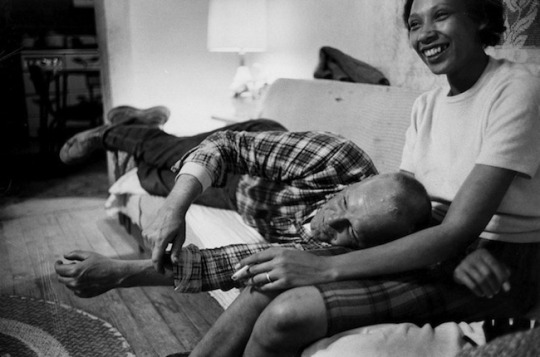
It was a simple act. A married couple, nestled on their couch enjoying a comedy on television. The moment captured by a photographer for TIME magazine, assigned to shoot a day in this couple’s life on the cusp of an enormous legal challenge to their family’s existence. What left me so shaken by this image, walking out of the theater at the end of Jeff Nichols’ new film “Loving” this past weekend, was what it means in the context of the choice we face tomorrow. I know there’s no sense in trying to convince anyone to reconsider his or her vote by rattling a saber with any greater fervor than I have over the last fifteen months. But in Nichols’ film, about a landmark court case in the late ‘60s regarding interracial marriage, the issues of intolerance and deeply rooted racism are confronted on a very humble, very human level, with the devastating consequences of the havoc that bigotry can wreak on even the most modest, hard working family brought into sharp focus.
Richard Loving and Mildred Jeter fell in love and decided to get married. Because the state they grew up in didn’t allow “mixing” races, they were forced to wed in Washington. Almost immediately after returning home, though, they were arrested and jailed, even though Mildred was already carrying the couple’s first child. This set off almost a decade of legal wrangling and heart-wrenching emotional upheaval for the couple and their 3 eventual children, which ended in a decision by the Supreme Court to strike down the law that had kept them apart. Again, it seems a simple act. Two people wanting to live quietly in the countryside, raising their kids surrounded by a doting family and the thoughtful, unassuming rhythms of rural life. Building a life with the sense of security, freedom and possibility that so many of us have taken for granted for our entire lives. To see the Lovings refused these basic rights with such immoral, unjustified coldness and hostility seems entirely alien in light of how much “progress” our nation has made in the time since, at least until you realize how the very existence of the breathtakingly idiotic “birther” movement blows that rose-colored supposition to smithereens.
It seems an obvious tenet, but endorsing the hatred and bigotry of any group (or petulant A.D.D. Oompa Loompas, for that matter) defies rationality and promotes emotional, verbal and physical abuse at a time when all kinds of vitriolic narrow-mindedness surges around the world. Racists often hold up freedom and individual opportunity as the most basic of their beliefs, yet actively rage against legislation for a means of achieving true freedom with respect for the rights of others. What this campaign has brought kicking and screaming into the national spotlight is just how closed off so much of arch-conservative thought is to progress and change, to tolerating differences or accepting new ideas of how to approach understanding other human beings. In that sense we haven’t come far AT ALL from the time in which the Lovings fought just to live their lives in peace. In many ways it seems we haven’t learned a thing, only succeeding in sweeping our more extreme prejudices under the carpet until a certain catalyst (see Oompa Loompa mentioned above) appeared and delighted in exploiting them for personal gain. My biggest fear, should that unthinkable alt-right hand grenade go off tomorrow, is that whatever progress we have made as a society, whether it has to do with racial or sexual discrimination, will become the shrapnel that tears the whole damn thing apart once and for all. It’s anyone’s right to keep what I say at arm’s length, dismissing it as typical liberal hyperbole, but I believe, with all my heart, that this would be a lazy, and ultimately tragic, mischaracterization. We HAVE to understand what is at stake, and fight like hell to knock this hateful, ignorant bullshit back forever. Otherwise this country truly will perish from the Earth, and rightfully so.
0 notes